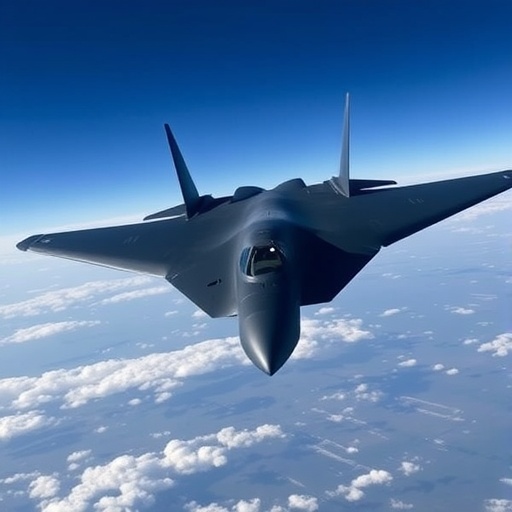Trump Denies B-1 Bomber Deployment Near Venezuela as U.S. Launches Ninth Drug War Strike
In a fiery White House press briefing, President Donald Trump categorically denied reports from The Wall Street Journal claiming U.S. B-1 bombers were spotted flying perilously close to Venezuelan airspace, even as the U.S. military executed its ninth strike against suspected drug-smuggling vessels in the region. This bold assertion comes amid an intensifying drug war that has seen American forces ramp up operations to curb the flow of narcotics from South America, drawing sharp rebukes from neighboring countries like Colombia and Mexico.
The denial, delivered with Trump‘s characteristic bluntness, underscores the administration’s aggressive posture against what it calls a ‘narco-terrorist threat’ emanating from Venezuela. ‘Fake news, total hoax,’ Trump declared to reporters, slamming the Journal’s reporting as ‘irresponsible journalism that endangers lives.’ Yet, the timing couldn’t be more charged: just hours after the bomber allegations surfaced, U.S. Navy vessels in the Caribbean unleashed precision-guided munitions on a flotilla of speedboats believed to be transporting cocaine bound for U.S. shores.
This latest escalation highlights a multifaceted strategy blending military strikes, diplomatic pressure, and international partnerships. Since taking office, the Trump administration has authorized eight prior operations, sinking or disabling over a dozen vessels and seizing an estimated 15 tons of narcotics. But critics argue this approach risks inflaming regional tensions, particularly with Venezuela’s socialist government under Nicolás Maduro, which has long accused the U.S. of orchestrating a covert invasion.
Trump’s Blunt Rebuttal Shakes Up Bomber Controversy
President Trump’s response to the B-1 bomber reports was swift and unyielding, labeling the story a ‘witch hunt’ designed to undermine his administration’s resolve in the drug war. Speaking from the Oval Office, Trump emphasized that no such aircraft had been deployed near Venezuela, attributing the sightings to ‘misidentified commercial flights or perhaps some overzealous surveillance drones.’ Military experts, however, remain divided. Retired Air Force General Mark Schwartz told CNN, ‘B-1s are strategic bombers, not your everyday patrol craft. If they were there, it would signal a major escalation, but Trump’s denial aligns with official DoD briefings.’
The Wall Street Journal’s report, based on anonymous sources within the Pentagon, described the bombers conducting ‘routine training missions’ that inadvertently skirted Venezuelan territorial waters. Satellite imagery purportedly showed the Lancer jets—capable of carrying 24 tons of ordnance—loitering near the Paraguaná Peninsula, a known hub for illicit shipping. Venezuelan officials seized on the story, with Foreign Minister Jorge Rodríguez tweeting, ‘Imperialist vultures circle our skies. This is provocation, not protection.’ Trump’s rebuttal has fueled a media frenzy, with fact-checkers scrambling to verify the claims amid classified blackouts on military movements.
Behind the scenes, the controversy reveals deeper frictions within the U.S. defense establishment. Sources close to the Joint Chiefs indicate that while B-1 bombers haven’t been officially tasked for Venezuela operations, increased aerial reconnaissance has been greenlit under Operation Orion, a classified initiative targeting drug cartels. This program, launched in 2019, has integrated B-52s and unmanned drones but stops short of deploying heavy bombers like the B-1, according to declassified summaries. Trump’s denial may serve to de-escalate rhetoric, but it hasn’t quelled speculation about future military strikes if Venezuelan complicity in trafficking is proven.
Ninth Strike Sinks Suspected Narco-Submarines in Caribbean Waters
As Trump’s words echoed through Washington, the U.S. Southern Command announced the ninth military strike in its campaign against drug smugglers, targeting a convoy of semi-submersible vessels off the Venezuelan coast. The operation, codenamed Swift Dagger, involved two guided-missile destroyers and a P-8 Poseidon patrol plane, resulting in the neutralization of three boats laden with an estimated 2.5 tons of cocaine valued at $75 million on the street.
Details emerged in a Pentagon press release: At dawn, U.S. forces intercepted radio chatter linking the vessels to the Cartel of the Suns, a Venezuelan military splinter group accused of profiting from the narcotics trade. ‘These weren’t fishermen; they were foot soldiers in a global drug war,’ said Admiral Craig Faller, head of SOUTHCOM. The strikes employed non-lethal warning shots initially, but when the boats attempted to flee, Hellfire missiles from the Poseidon brought them to a halt. No casualties were reported, but the vessels were scuttled to prevent salvage by traffickers.
This marks a tactical evolution from earlier raids. The first strike in January 2017 targeted Colombian speedboats, while subsequent ones have zeroed in on Venezuelan routes, where 40% of U.S.-bound cocaine transits according to DEA estimates. Over the past three years, these operations have disrupted 120 smuggling runs, leading to the arrest of 45 suspects and the forfeiture of $500 million in assets. Yet, the ninth strike’s proximity to Venezuelan waters—less than 12 nautical miles—has prompted Maduro’s regime to file a protest with the UN, calling it an ‘act of war.’
Statistics paint a grim picture of the stakes: The UN Office on Drugs and Crime reports that Venezuela serves as a primary corridor for 70% of cocaine leaving South America, fueling an opioid crisis that claims 100,000 American lives annually. Trump’s administration has poured $1.2 billion into interdiction efforts, including radar upgrades and joint task forces with allies. But success is elusive; for every ton seized, experts believe ten more slip through.
Colombian and Mexican Leaders Voice Alarm Over U.S. Tactics
The ripple effects of the U.S.’s aggressive military strikes are being felt across Latin America, with Colombia and Mexico leading a chorus of criticism. Colombian President Iván Duque, whose country has borne the brunt of the drug war for decades, warned that American incursions near Venezuela could destabilize the fragile peace process with FARC dissidents. ‘We applaud the fight against narcos, but unilateral actions risk turning neighbors into enemies,’ Duque stated during a Bogotá summit.
Mexico’s response has been even more pointed. President Andrés Manuel López Obrador, navigating his own battles with cartels, accused the U.S. of hypocrisy. ‘While Trump deploys bombers and strikes, our shared border sees record fentanyl deaths. Where is the partnership?’ AMLO asked in a televised address. Mexican officials cite a 25% spike in migrant flows from Venezuela, attributing it to economic fallout from U.S. sanctions and military posturing. Bilateral trade, already strained, now faces potential tariffs if cooperation falters.
Regional experts echo these concerns. At a think tank panel hosted by the Council on Foreign Relations, analyst Shannon O’Neil noted, ‘The B-1 reports, true or not, amplify fears of Yankee imperialism. Colombia and Mexico want drug interdiction, but not at the cost of sovereignty.’ Data from the Inter-American Dialogue shows U.S. aid to anti-drug efforts in Latin America has doubled to $800 million since 2017, yet approval ratings for American policies have plummeted to 35% in both countries.
Diplomatic cables leaked to Reuters reveal frantic backchannel talks. U.S. Ambassador to Colombia, Kevin Whitaker, assured Duque that no B-1 bombers were involved, pledging enhanced intelligence sharing instead. In Mexico City, negotiations for a trilateral summit aim to recalibrate the drug war strategy, focusing on demand reduction in the U.S. rather than supply-side hammer blows.
Venezuela’s Narco-State Accusations Fuel International Tensions
At the heart of this storm lies Venezuela, where allegations of state-sponsored drug trafficking have long simmered. The Trump administration has designated several Maduro allies as ‘specially designated narcotics traffickers,’ freezing $300 million in assets and imposing travel bans. The ninth military strike targeted vessels linked to Diosdado Cabello, Venezuela’s National Assembly president, whom U.S. prosecutors indict for cocaine conspiracy.
Venezuelan state media has retaliated with propaganda blitzes, broadcasting footage of alleged U.S. spy planes and warning of ‘imminent invasion.’ Maduro himself addressed the nation, vowing to arm coastal militias against ‘gringo aggressors.’ This rhetoric has galvanized domestic support, with polls showing 60% of Venezuelans viewing the U.S. as the primary threat amid hyperinflation and food shortages.
International observers, including the Organization of American States, have urged restraint. OAS Secretary-General Luis Almagro called for a special session on the bomber reports, citing Article 22 of the Democratic Charter. Meanwhile, Russia and China—Venezuela’s key backers—have dispatched warships to the Caribbean, ostensibly for joint exercises but widely seen as a counter to American B-1 bombers and strikes.
The human cost is stark: Over 7 million Venezuelans have fled since 2015, many via drug routes that now double as escape paths. Humanitarian groups like Human Rights Watch decry the drug war‘s collateral damage, with strikes disrupting aid deliveries and exacerbating the refugee crisis at U.S. borders.
Looking ahead, the Trump administration faces pivotal choices. With midterm elections looming, bolstering the drug war credentials could rally his base, but alienating Latin American allies risks broader isolation. Proposals for a hemispheric anti-narcotics pact, floated by Secretary of State Mike Pompeo, include economic incentives for Venezuela’s opposition and tech transfers to Colombia’s navy. If the B-1 controversy fades, focus may shift to non-military tools like cyber operations against cartel finances. Yet, as smugglers adapt with drone deliveries and blockchain laundering, the U.S. must innovate or risk the drug war becoming an endless quagmire. Regional stability hangs in the balance, with Trump’s next move potentially reshaping alliances for years to come.








